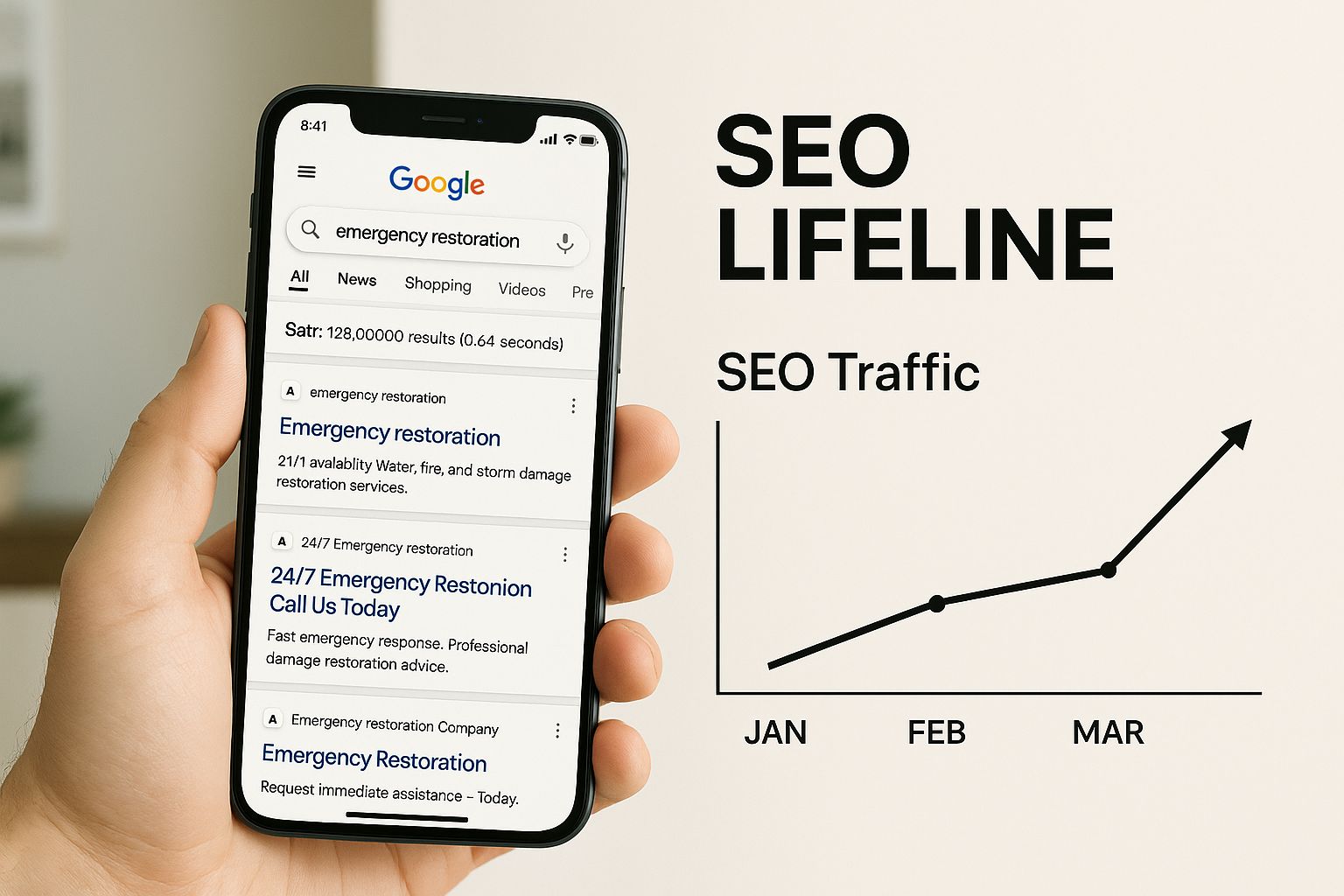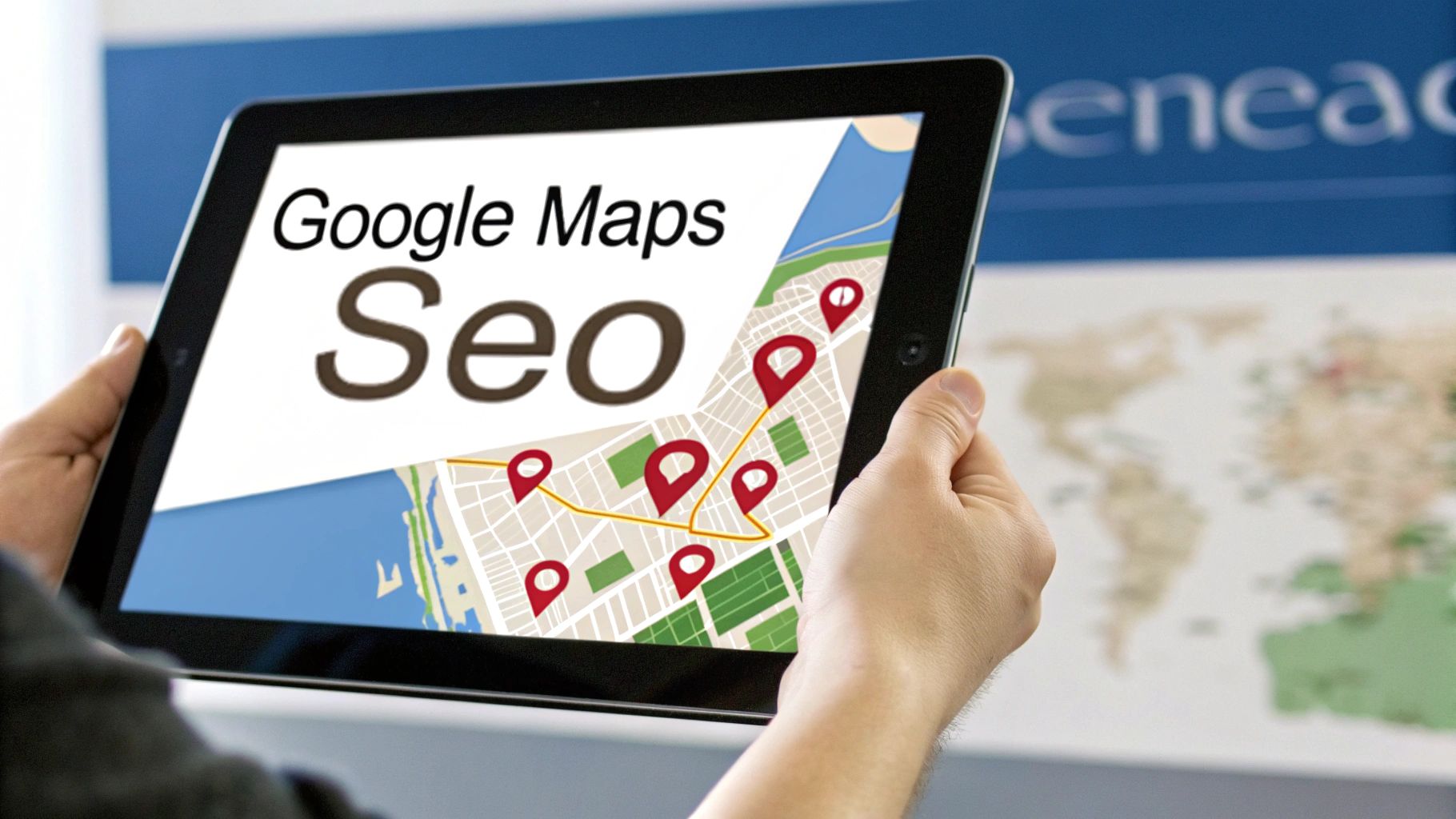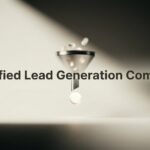When a pipe bursts and floods a basement at 2 AM, the homeowner isn't scrolling through Instagram. They're grabbing their phone and frantically Googling things like "emergency water damage repair near me."
This is where disaster restoration SEO comes in. It’s not just about marketing. It's about being the first and most trusted name that pops up when someone in your town is having the worst day of their year.
Why SEO Is Your 24/7 Dispatcher
Think about it. In a crisis, people don't have time to ask neighbors for recommendations. They need help now. Their decision-making process is short, and it almost always starts with a Google search.
If your company isn't on that first page of results, you're invisible. Your online presence is your emergency response system. SEO is the fuel that makes it run.
This guide will walk you through the strategies to get your phone to ring. We'll show you how to connect with desperate homeowners and turn their panic-Googling into your next job.
Our Goal:
- Dominate Local Search: Own the search results in the specific cities you serve.
- Get the Call: Turn your website into a "call now" machine.
- Build Instant Trust: Show them you're the reliable expert they need.
Your Golden Opportunity in a Crowded Field
The disaster restoration industry is booming. It is projected to hit $7.1 billion by 2025 in the U.S. alone. But the market is incredibly fragmented. No single company owns more than 5% of the market.
What does that mean for you? It means the game is won locally. Small and regional restoration companies can become the go-to provider in their area. You can learn more about these industry dynamics and how they favor local players.
A smart SEO strategy is your lifeline. It connects you directly to a homeowner in their moment of need.

As you can see, ranking at the top of Google isn't a vanity metric. It's the most direct path to a customer who needs your emergency services right now.
Finding the Keywords Your Customers Actually Use
A strong disaster restoration SEO strategy starts with understanding a panicked homeowner. You need to know the exact words people type when water is pouring through their ceiling.
They aren't just browsing; they're in crisis mode. Their searches are desperate and direct. Your job is to capture that "I need help right now" moment with the right keywords.
Think Like a Stressed-Out Homeowner
When a pipe bursts at 2 AM, search queries get specific, fast. People combine their problem, their location, and their urgency.
Every keyword you target needs three key ingredients:
- The Problem: What’s the disaster? Think "burst pipe cleanup," "sewage backup removal," or "black mold remediation." Be specific.
- The Place: Where are they? This is the heart of local SEO. Target phrases like "fire damage repair Austin" or "flood cleanup near me."
- The Urgency: How fast do they need you? Words like "24/7," "emergency," and "24-hour" are crucial.
Combine them, and you get pure gold: "24/7 emergency water damage restoration [Your City]." That’s a keyword that makes the phone ring.
In Short: Your keywords should mirror the frantic thoughts of a homeowner in crisis.
Building Your High-Intent Keyword List
Start with a simple "seed list" of your services. Write down water, fire, mold, and storm damage cleanup, then branch out.
Plug those core terms into tools like Ahrefs or SEMrush. You'll uncover dozens of long-tail variations. These are longer, specific phrases that attract ready-to-buy customers.
For example, instead of just "water damage," you'll discover what people actually search for:
- "cost to repair basement water damage"
- "hardwood floor water damage repair"
- "ceiling water damage cleanup service"
After you know what people search for, understanding the role of keywords in content strategy is the next step. This helps you map each keyword to a specific page on your site.
High-Intent vs. Informational Keywords
Not every search is an emergency call. Some people are just looking for information. You need to know the difference.
Here's a quick comparison. One type leads to a job, while the other builds your reputation as an expert.
High-Intent vs Informational Keyword Examples
This table shows the difference between keywords used by people ready to hire versus those just looking for information.
| Keyword Type | Example Keyword | User Intent | Best Content Type |
|---|---|---|---|
| High-Intent (Transactional) | "emergency flood cleanup Dallas" | Needs immediate help; ready to hire a professional. | Service Page, Local Landing Page |
| Informational | "how to prevent pipes from freezing" | Looking for advice or DIY solutions; not yet a customer. | Blog Post, How-To Guide |
| High-Intent (Transactional) | "mold remediation company near me" | Actively looking for a service provider right now. | Service Page, Google Business Profile |
| Informational | "what does black mold look like" | Researching a problem; trying to identify an issue. | Blog Post, FAQ Page |
Your main service pages need to focus on high-intent, transactional keywords. Use informational keywords for helpful blog content that builds trust.
What are the best keywords for a restoration company?
The best keywords combine a specific service, a location, and urgency. Start with services like "water damage restoration" or "fire damage repair." Add your city ("water damage restoration Phoenix") and emergency terms ("24-hour fire damage repair"). That’s the magic formula.
How do I find local SEO keywords?
Start typing your service into Google and see what it suggests. The "People Also Ask" box is another goldmine for common questions. Tools like Ahrefs' Keyword Explorer let you filter ideas by city or zip code to see what local customers are searching for.
Turning Your Website from a Digital Brochure into a 24/7 Dispatcher
You have your list of high-intent keywords. Now, it's time to tune up your website. When a frantic homeowner lands on it, their first instinct should be to call you.
This is where on-page SEO comes in. Your website needs to be fast, reassuring, and simple for someone ankle-deep in water.

Create a Dedicated Page for Every Single Service and Town
Generic pages don't rank, and they don't convert. You must get specific.
If you offer four services and serve ten towns, you need 40 unique pages (4 services x 10 towns).
Yes, it's a lot of work, but it's non-negotiable for local SEO.
- Service Pages: A page for "Water Damage Restoration" lets you go deep on that topic. You can detail your process, equipment, and answer common questions.
- Location Pages: A page for "Water Damage Restoration in Springfield" tells Google you are the expert for that service in that specific town.
This structure makes you hyper-relevant. When someone in Springfield has a burst pipe, your targeted page is more likely to show up than a generic homepage.
In Short: Don't lump all your services or locations onto one page. It kills your SEO.
Weave Your Keywords into the Page Naturally
Now, put those keywords to work. Make it clear to Google what each page is about without sounding like a robot.
Here’s a quick checklist for every page:
- Page Title (Title Tag): This is the blue link in Google search. Make it relevant:
24/7 Water Damage Restoration in Springfield | Your Company Name. - Main Headline (H1 Tag): This is the first thing people see. It should echo the title:
Emergency Water Damage Repair in Springfield. - Subheadings (H2s, H3s): Use keywords in subheadings like
Our Springfield Water Cleanup ProcessorCommon Causes of Fire Damage. - First 100 Words: Include your main keyword and location early. This signals to Google and visitors that they're in the right place.
This is not "keyword stuffing." It's about strategic placement.
Write Copy That Reassures, Not Sells
Your website visitor is having a bad day. They don't need marketing fluff. Your copy must be calm, direct, and reassuring. This is a crucial part of any water damage contractors marketing plan.
Cut the jargon. Use short sentences. Get straight to the point. Your copy should immediately answer three questions:
- Can you fix my disaster? (Yes, we handle everything from burst pipes to kitchen fires.)
- Can you help me right now? (Yes, our trucks are ready 24/7.)
- How do I contact you? (Here's our phone number, big and bold, at the top.)
This approach builds instant trust.
Don't Sweat the Small Stuff (Actually, Do)
A few technical details can make a big difference.
Mobile Speed is Everything
Most emergency searches happen on a phone. If your site takes more than three seconds to load, visitors will leave. Use Google's PageSpeed Insights to check your speed.
Use Local Business Schema
Schema markup is like a cheat sheet for Google. It's code that tells Google you're a local restoration company, what your hours are, and what services you offer. This helps you stand out in search results.
How to Dominate Google Maps and Local Search
For any disaster restoration business, local search is the entire game. When a basement is flooding, homeowners search for the closest, highest-rated company that can get there now.
Winning the top spot in the Google Map Pack is how you win the job.
Your Google Business Profile (GBP) is your most valuable marketing tool. A well-managed GBP gets you found in "near me" searches.
This is your command center for managing how your business appears on Google Maps and in local search.

From here, you control everything a customer sees, from services to reviews.
Getting Your Google Business Profile Dialed In
Your GBP is like a mini-website on Google. It's often the first impression. Fill out every section completely and accurately.
These are non-negotiable:
- Primary Category: It must be "Damage Restoration Service." Don't get creative.
- Secondary Categories: Add every other relevant service, like "Water damage cleanup service," "Fire damage restoration service," and "Mold remediation service."
- Service Area: Clearly define the specific cities, towns, and zip codes you cover.
In Short: Your business description is a golden opportunity. Weave in keywords like "24/7 emergency water damage restoration in [Your City]" and highlight what makes you the right choice.
The Undeniable Power of Customer Reviews
In a crisis, trust is everything. A list of recent, glowing reviews is powerful social proof. Over 85% of consumers trust online reviews as much as a personal recommendation.
You need a system to get reviews.
- Ask at the Right Time: Ask right after the job is done and the customer is relieved.
- Make It Easy: Text or email them a direct link to your GBP review page.
- Respond to Every Single Review: Thank customers for positive feedback and address negative reviews professionally.
Responding to a negative review shows you take feedback seriously. This can be as powerful as a five-star review. You can learn more about how to master local Maps SEO to improve your review strategy.
Building Citations and Keeping Your NAP Consistent
Google scans the web for mentions of your business, called citations. These verify you are a legitimate local company.
The most critical part is keeping your Name, Address, and Phone Number (NAP) identical everywhere.
- Correct: "Joe's Restoration LLC," "123 Main St, Anytown, USA," "555-123-4567"
- Incorrect: "Joes Restoration," "123 Main Street," "(555) 123-4567"
Even small variations can confuse search engines.
Where Should You Build Citations?
Focus on quality over quantity.
- Major Aggregators: Get listed on platforms like Data Axle and Neustar.
- Big Name Directories: A presence on Yelp, Angi, and the Better Business Bureau (BBB) is essential.
- Industry-Specific Sites: Look for directories focused on contractors or home improvement.
A clean, consistent NAP profile across the web is a massive trust signal. It helps lock in your position in the Google Map Pack.
Building Trust with Content and Backlinks
Your service pages are dialed in. How do you prove to Google—and to a homeowner in crisis—that you're the real deal?
This is where your disaster restoration SEO strategy becomes dominant. It's about building authority through helpful content and earning trust from other local businesses.
Answering Real Questions with Helpful Content
When a basement is flooding, a homeowner's first search might be "what to do when pipe bursts." They need answers, not a sales pitch.
This is your golden opportunity. Content marketing for restoration companies means being the calm, expert voice in the storm.
Think about the questions people have:
- What should I do after a small kitchen fire?
- Can I clean up minor water damage myself?
- How long does it take for mold to grow after a leak?
By creating blog posts that answer these questions, you position yourself as a helpful expert. You build trust before they even need to call.
In Short: Write about your customers' fears and urgent questions, not just your services.
Simple Link Building for Local Authority
Backlinks are "votes of confidence" from other websites. When a respected local plumber links to your site, they tell Google, "This restoration company knows their stuff."
For a local business, this is a massive signal that helps you climb the rankings. Link building is about relationships.
Who Should You Get Links From?
Get digital handshakes from other relevant, trusted businesses in your community.
- Plumbers: They are on the front lines of water damage. A link from a local plumber is gold.
- Insurance Agents: Homeowners trust their agents. A link from an agent's blog is a huge credibility booster.
- Property Managers: They constantly need reliable contractors.
- Local News or Community Sites: A feature in a local blog for a community event provides a powerful link.
This local link building proves to search engines that you're a respected part of your business community.
Once your content is live, you need to know if it's working. For more on this, see this guide on how to measure content performance effectively.
How Do You Get Backlinks for a Restoration Company?
Start simple and local. Join your Chamber of Commerce for a directory link. Sponsor a little league team and ask for a link on their site. Build real relationships with plumbers and insurance agents. Offer to write a guest post for their blog on preventing water damage in exchange for a link back to your site.
Is Content Marketing Important for SEO?
Yes, it's non-negotiable. Content marketing helps you show up for informational searches. It builds trust, establishes you as the expert, and gets you in front of potential customers early. When an emergency strikes, you'll be the first company they think of.
What Kind of Content Should a Restoration Company Create?
Focus on being helpful. Create practical guides ("How to Safely Handle a Sewage Backup Before Help Arrives"), checklists ("Your Winterization Checklist to Prevent Frozen Pipes"), and answer common questions ("Does My Homeowners Insurance Cover Mold?"). The more you educate people in a stressful time, the more they will trust you.
Got Questions About SEO for Your Restoration Business?
If you're diving into disaster restoration SEO, you probably have questions. Let's tackle some of the most common ones we get from restoration company owners.
How Long Until My Phone Starts Ringing from SEO?
Let’s be real: SEO is a marathon, not a sprint.
You might see early results in local map rankings within 2-3 months. But for big wins—ranking on the first page for keywords like "water damage repair [your city]"—be patient.
Plan on 6 to 12 months to see significant, steady results. This gives Google time to trust your website as an authority in your area.
Factors that affect this timeline include:
- Your Competition: Ranking in a major city is harder than in a small town.
- Your Website's Age: An older site has a head start over a brand-new one.
- Your Consistency: SEO rewards consistent effort with new content, reviews, and links.
Should I Worry About National SEO or Just Focus Locally?
For a disaster restoration company, local SEO is everything. Your customers are in your service area. They are searching for "emergency flood cleanup near me," not for a company across the country.
Your marketing must live where your customers are.
Put 99% of your focus on dominating your local service area. Obsess over your Google Business Profile, build local citations, and create content for the neighborhoods you serve.
Can I Just Do This SEO Stuff Myself?
You absolutely can. Getting your hands dirty with the basics is a great way to understand your online presence.
Many owners successfully manage their own foundational SEO, including:
- Optimizing their Google Business Profile.
- Asking every happy customer for a review.
- Tuning up the on-page SEO for their main service pages.
But as you climb the rankings, the game gets tougher. Advanced strategies like technical SEO audits and high-level link building are more complex. Many owners handle the basics and partner with an agency for heavy lifting and faster growth.
What's a Realistic SEO Budget for a Restoration Company?
The investment can range widely, but a local restoration business typically budgets between $1,500 to $5,000+ per month.
Where you fall in that range depends on your city's size, your competition, and your growth goals.
Think of it as an investment in your most powerful lead source. A good SEO campaign brings in high-ticket jobs that pay for the investment many times over. Landing just one or two extra jobs a month can deliver a fantastic ROI. If you're weighing options, understanding the differences between PPC vs SEO for water damage services is a great place to start.
At Clicks Geek, we specialize in turning your website into a powerful lead-generation machine. If you're ready to dominate your local market and get your phone ringing, schedule a free strategy session with us today.
Want More Leads for Your Business?
Most agencies chase clicks, impressions, and “traffic.” Clicks Geek builds lead systems. We uncover where prospects are dropping off, where your budget is being wasted, and which channels will actually produce ROI for your business, then we build and manage the strategy for you.






